Horace was born on 22nd May 1885 in the village of Chelveston, just outside Rushden, the eldest of six children of Eli Wright, a ‘shoe riveter’, and his wife Harriet (neé Burton). His parents had married nine months before, at Thrapston and, soon afterwards, they were living at Harborough Park Road (later, just Harborough Road), Rushden, where they were to reside for the rest of their lives.
Horace was brought up in Harborough Road, together with his five siblings - Thomas Burton (Bert) (b.1887), Florence (b.1889), Lily (b.1891), Sidney (b.1895) and Ernest (b.1898). Horace used to say that, being the eldest, he had to take a large part in helping his parents raise the family. His parents were committed Baptists and raised their children in the same faith.
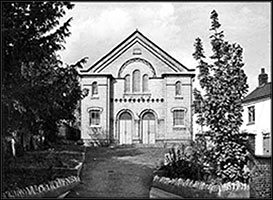 |
|
Old Baptist Church in Little Street
|
The 1891 and 1901 census returns confirm the family’s residence at Harborough Road. By 1901, Eli and Harriet were 42 and 36 years old respectively and their young family growing fast: Horace (15), Bert (13), Flo (11), Lily (9), Sidney (5) and Ernest (3).
They had all been baptised in the ‘Old’ Baptist Chapel in Little Street, where Horace’s father, Eli, was a ‘teacher’ to the congregation. The children all attended Sunday School. That Chapel was replaced in 1901 by a much larger and impressive church in Park Road.
Horace attended a local school from 1897, when he was 12 years old. The Elementary Education Act of 1876 had placed a duty on parents to ensure that their children received elementary instruction in reading, writing and arithmetic. Eli had to obtain a certified copy of Horace’s birth certificate prior to his entry to the school and this has survived today, having been signed 19th May 1897:
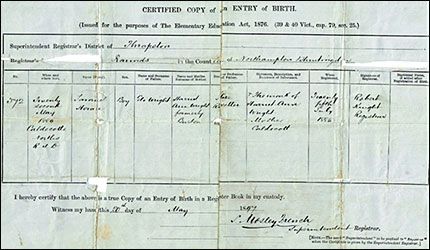 |
|
Copy of the entry of Horace's birth within the registrar's record book
|
|
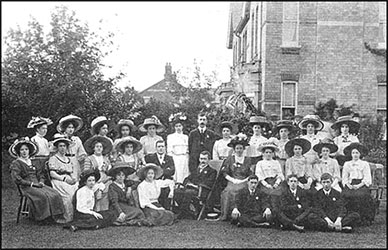 |
|
Primary Helpers - Leader Horace Wright (middle row 5th fr left)
|
|
After two years of schooling, Horace, then aged 14 years, was apprenticed into the boot and shoe trade for a period of seven years, ending in 1906, when he was 21 years old. By then, he had become a keen sportsman, a member of the Boys’ Brigade, a member of the Christian Endeavours movement and Leader of the Baptist Church’s Primary Helpers (Sunday School staff). He was joined in that work by his sister Florence, then aged 16 and the two sisters, Florence and Alice Deacon. Sister Flo can be seen in the photo (right), taken in 1910, on the back row, 4th from the right and Florence Deacon on the back row, 4th from the left. Alice Deacon was absent from the photo.
The following year, 1907, Horace kept a daily diary, which has survived today (Nesta collection). It is significant because that was the year when Horace first began courting Alice Deacon from No 8 Crabb Street, then only 17 years old and five years younger than him. Horace was ‘walking out’ with another girl at the start of the year, to whom he refers in his diary, simply as ‘the girl’, but on March 3rd, Alice started Sunday School teaching with Horace and, as the saying goes, ‘the rest is history’. The 1907 diary is a detailed record of their growing affection for each another, of multiple bike rides and visits to nearby towns and villages; and, as the year progressed, almost daily letters between them when they were apart, and even the occasional tiff:
Aug. 27th 1907: “Letter from Alice about the shameful way she had treated me.”
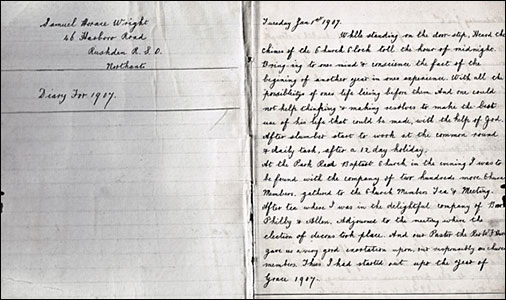 |
|
Letter from Alice
|
Alice was an accomplished musician. Family tradition is that she wished to pursue a career as a concert pianist, but her father would not consent. She was a regular member of the church choir for many years and sometimes played the organ in the church. Horace had a sonorous bass-baritone voice and they often made music together, both for themselves and for others. I spent many an hour on the piano with my grandmother; she taught me the notes and simple theory and we played simple duets together, as she encouraged my love of making and listening to music.
Transcripts of the first week’s entries in the diary follow, showing how Horace, aged 21, spent his time. His devotion to his church is self-evident; the church to which he was to become, in due course, a Lifetime Deacon for 58 years, from 1921 until his death in 1979.
Tuesday Jan. 1st 1907
While standing on the door-step, heard the chimes of the Church clock toll the hour of midnight, bringing to one’s mind and conscience the fact of the beginning of another year in one’s experience, with all the possibilities of one’s life lying before them. And one could not help thinking and making resolves to make the best use of his life that could be made, with the help of God. After slumber, started to work at the common round and daily task, after a twelve-day holiday.
At the Park Road Baptist Church, in the evening, I was to be found with the company of two hundred more Church Members, gathered to the Church Members’ Tea & Meeting. After tea, where I was in the delightful company of Bros Philby and Allen, adjourned to the meeting where the election of Deacons took place. And out Pastor, the Rev. F.W. Harris gave us a very good exhortation upon our responsibility as church members. Thus, I had started out upon the year of Grace 1907.
Wednesday Jan. 2nd 1907
With a fair amount of health and strength, to work as usual. Wednesday evenings are one of the evenings of the week to which I look forward, because of the meeting held at night in the interests of Christian Endeavours. This being the first evening of the month, it was a Consecration meeting, at which our President presided, and gave us a very good address upon numbering our days. Went into the Boys Life Brigade Meeting, of which I am a Member, holding the position of Lieutenant, closing the night with a walk down Crabb Street.
Thursday, Jan 3rd 1907
Eagerly looking forward to the Social in the evening, of the Boys Life Brigade. At 7 o’Clock an excellent repast was provided by the Friends of the Officers at which nearly 60 boys and 40 friends sat down. After tea, a concert had been arranged, in which many of the boys took part. My part to the programme was a song “Riding down from Bangor”, which I had to give an encore to.
Friday, Jan 4th 1907
The daily round. Work. Pay night 19s-7d.
Saturday Jan 5th 1907
Half day holiday, much enjoyed. In the afternoon, went to see the Institute Football Club play Woolaston WMC, who they beat by the tune of 5 goals to nil. Brother Bert played for the first time in league football. Paid half year’s subscription to the Institute – 2/6d. Prayer meeting at night. Had a short stay with friends at no.8. (the first reference to Alice Deacon’s family at Crabb Street – Ed)
Sunday, Jan 6th 1907
To chapel in the morning, where our Pastor preached from the Motto Text (“Our God for Ever – Our Guide unto Death”). Thoroughly enjoyed it, made it quite plain, the points he tried to express were God’s Eternity and Man’s Immortality. God our Guide unto Death, not only unto, but into and through death. Sunday School in the afternoon, where I am a Teacher. Had to meet a new class of boys. The first time with them I enjoyed, although they have the character of being rather notorious; hope to have the power given to appeal to better natures.
Being the first Sunday in the New Year, our Pastor preached a special sermon to young people, at which service the Boys Brigade attended in Company. The subject of the sermon was ‘Playing with Fire’. There was a crowded congregation.
Monday, Jan 7th 1907
Had to start on short-time, from 8 in the morning to 4 in the afternoon, losing 2 hours in a day. Went straight to a special prayer meeting at the Assembly Rooms, which was arranged by the Free Church Council, this meeting was a united one of the Free Church.
Horace and Alice courted for seven years, eventually marrying on 31st July 1913, when Horace was 28 and Alice 24 years old. During those seven years, Horace worked hard in the day, saving to buy a house and, at night, attended the Campbell Square Evening School in Northampton, to further his qualification. Two months before his wedding, he was awarded the end of course School Scholarship in recognition of his achievements. (Northampton Chronicle & Echo 31st May 1913, page 2, col. 6).
The wedding was a splendid affair, reported at length in the local newspaper, a copy of which has survived (Nesta collection). The opening paragraphs are given below, giving a sense of the occasion. The remainder of the report gave details of the service (choice of hymns and music etc.) and a full list of presents given to the couple. Horace gave Alice a piano and she gave him an umbrella!
31st July 1913: Marriage of Horace and Alice Wright (News cutting not dated)
A very pretty wedding took place at the Park Road Baptist Church yesterday, the contracting parties being Miss Alice Deacon, eldest daughter of Mr & Mrs Henry James Deacon of 8, Crabb Street, Rushden and Mr Samuel Horace Wright, eldest son of Mr & Mrs Eli Wright, of 46 Harborough Road, Rushden. The ceremony was conducted by the Rev. H.J. Horn.
The bride, who was given away by her father, wore a dress of cream silk warp, trimmed with cream satin and French knots. She wore a hat to match and carried a shower bouquet of lilies, sweet peas and gypsophilia, the gift of the bridegroom. Four bridesmaids were in attendance, the Misses Florrie and Bessie Deacon (sisters of the bride) and Florrie and Lilly Wright (sisters of the bridegroom). The Misses Florrie Wright and Florrie Deacon wore dresses of grey ‘San Toy’ and the Misses B. Deacon and L. Wright wore gowns in biscuit coloured ‘San Toy’. All wore hats to match. The Misses Wright wore gold brooches and the Misses Deacon gold bangles, the gifts of the bridegroom. All carried bouquets of sweet peas and gypsophilia. Mr Harold Clipson, friend of the bridegroom, capably carried out the duties of Best man. Following the ceremony, a reception was held in the Park Road Baptist Assembly Rooms and subsequently, Mr & Mrs Wright left for Folkstone, where the honeymoon is being spent.
On their marriage certificate Horace is described as ‘Foreman in Shoe Factory' (un-named), having clearly worked himself off the shop floor. He soon worked himself into the position of a Director and, at the end of 1914, he decided to leave that business, in order to set up his own company, the Tecnic Shoe Company, together with Fred Hawkes, Walter Tarry and Sidney Fox. The inaugural meeting of that company took place on 12th February 1915, when Fred Hawkes was elected Chairman. Horace was described then as being the ‘Director of a cut sole company’.
Horace left the Tecnic Shoe Company at the end of its first year of trading, in February 1916, in order to launch his own business, Summit Footwear, of which he was sole proprietor. Tecnic Shoe Company prospered for over 90 years, with a series of take-overs and name changes, becoming Marks & Spencer's largest shoe supplier under the brand of Lambert Howarth, until it finally went into administration in 2007.
Summit Footwear did not have such a long and distinguished history, but after a few years it was employing over 200 operatives and worked in a niche market for over twenty years, producing high class footwear for Youths and Boys, until its closure in October 1938. [Its history is best told through a series of articles from the website of the Rushden & District History Society Research Group]
Mr. Horace Wright has always been ambitious and has forged his way to his present position by sheer hard work and force of character. He began as a stiffener boy and was successively laster, operator on Rex Pull Over, and manager of a lasting department. He was recently one of the directors of a limited company, but now manufacturer on his own account of speciality Good class Youths’ and Boys’ footwear. Mr. Wright has been a very successful technical student and gained the County Prize in 1909 for hand making, also passing in First Class Honours in lasting and management in 1910. He is alert and keen to introduce new and original styles and keep well to the front in shoe manufacture. Connected with the V.T.C. movement from its commencement and is now sworn in as a volunteer.
The employees of the Summit Boot Works, enjoyed a social evening at the Co-operative Hall in Friday 1932, when personal friends also numbered among the guests. The attendance was about 200, and but for illness the company would have been larger. Horace's wife and daughters were among those who were unable to be present.
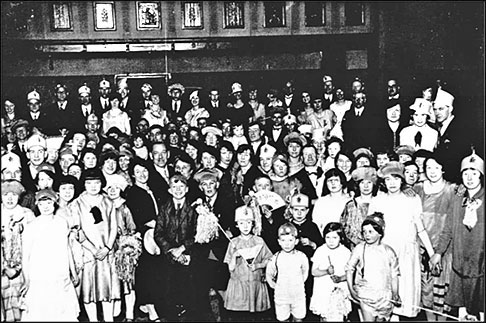 |
NB: Photo in Nesta’s collection, possibly from the above Social Evening
Horace in bow tie.
|
In 1937 there was a grand Coronation Parade through Rushden to mark the coronation of King George VI. It started in Washbrook Road and went via the Oakley, Wellingborough Road to Station Road, Station Road to High Street and finally from High Street to the grounds of Rushden Hall. The parade was led by the C. Coy, 4th Battalion, the Northants Regiment, Councillors, Clergy, Town Band and British Legion members, followed by 113 Floats and groups of people in fancy dress of various categories, all to be judged for prizes. Horace turned out two groups in the Works Group category – ‘The Lavender Girls’ and ‘The Hen-Pecked Husband’. Notable as one of the Group Marshalls at the event was Horace’s eldest son, Mr Donald Wright, then 21 years old.
Summit Footwear provided Horace and his family with a good living and a prestigious property in Essex Road, but it closed in October 1938 for reasons that are not entirely known. Horace never discussed the matter with me. My father told me he thought Horace’s involvement with the Baptist church and other organisations had become more important to him than his business, and that he got into financial difficulty and had to sell up. He then secured a post as a foreman in the boot and shoe company of John White of Rushden, with whom he stayed for the rest of his working life. Certainly, the news of the closure of Summit Footwear and the disposal of its premises, nine months later, was received in the town with a sense of disappointment. By then Horace and Alice had moved to a smaller house at 44 Newton Road, which they named ‘Fairfield’.
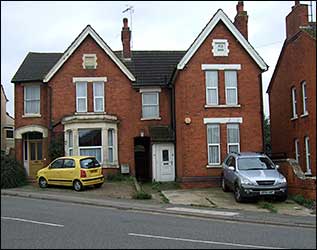 |
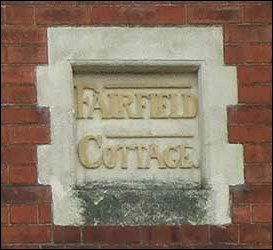 |
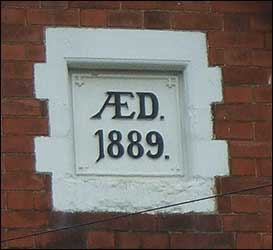 |
On the left Fairfield Cottage - originally Alfred Sargent's home
It became No 60 Newton Road after renumbering the road
Built in 1889 by AED No 58
|
|
Never one to be idle, in 1939 Horace soon started a new business, Horace Wright Ltd, operating a children’s wear shop at 121 High Street, Rushden, trading as The Children’s Shop, with Alice as the Manager and Horace managing the accounts and business elements. The shop opened on 17 th February 1939 in the High Street and was soon advertising regularly in local newspapers.
In 1955 they sold the business to Mrs. C. W. Asher of Higham Ferrers.
An Extraordinary General Meeting was convened at Rushden on 17th October the following year (1956), in accordance with the Companies Act 1948, when a special resolution was passed to wind-up the company of Horace Wright Ltd and to appoint George Richan Drever FSCA of Kettering as liquidator, this being posted in the London Gazette on 23rd October 1956.
So much for Horace’s business life, but what of his private life?
After they were married, Horace and Alice made their first home together in a terraced house in Harborough Road, a short walk from the Summit Footwear factory and the property of his father, Eli Wright. The 1910 Valuation of Harborough Road confirms that Horace had purchased the house [84] by then, several years before their wedding, and then leased it, until their marriage, to Samuel Burton, a relative of his mother.
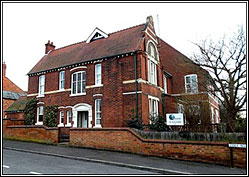 |
|
Cliftonville, 2 Essex Road,
now extended as a Residential Home
|
Within a few years, Summit Footwear was thriving, and Horace moved up-market, to a detached property at 2 Essex Road, close to the Baptist church, which he named Cliftonville, after the popular seaside resort, where he and Alice and family had enjoyed several holidays.
Horace and Alice went on to have four children, Donald Horace (1916), Nesta Alice (1919), Jean D. (1923) and Hilda José (1930) (see family group sheet attached). By the time José was born, Don was a boarding pupil at Culford School – a prestigious, non-conformist Public School four miles north of Bury St Edmunds in Suffolk, run in the Methodist tradition. Horace was always proud to have been able to send Don to Culford and, by all accounts, Don thoroughly enjoyed his time there.
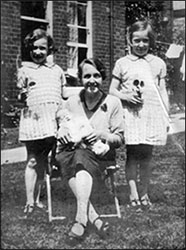 |
|
Alice holding José, Jean (7)
and Nesta (11) in 1930
|
Save for school holidays, therefore, Horace was at home with Alice and “my three girls”. The two photos here show the girls with Alice at Essex Road (1930) and the whole family together on holiday together at Gorleston in 1931:
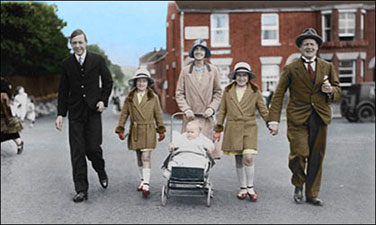 |
Horace (46) & Alice (42) with Don (13), Jean (8), Nesta (12)
and José (1) in pram, in 1931
|
Horace pursued many interests outside the home. From 1919, he was a leading member and secretary of the Baptists’ Recreation Club, where his own interests were in cricket and bowls. He was president of the Bowls club from 1939 and he was still active at the club 38 years later in 1957, as president of the Cricket Club. He would support any cause for clean and healthy lifestyles and in 1926 he had lobbied strongly for an open-air swimming pool at Rushden. In 1933 he presided at meetings of the various Rushden sports’ organisations and he was also on the committee of the Rushden Temperance Band. He was a popular and respected resident of Rushden. In the mid-1930s Horace became President of the local Sunday School Union and there are several reports of him and Alice presenting prizes to scholars at various Sunday schools. (e.g. Northants Evening Telegraph - Friday 13 January 1939)
The 1920s and 1930s were Halcyon days for the Wright family. After the collapse of Summit Footwear in 1938, they settled down to a modest standard of living at their new house in Newton Road. The following year World War II broke out and the established order soon changed. But the years passed, and the children grew up in a happy and secure relationship, always supported and enriched by the congregation of Park Road Baptist Church.
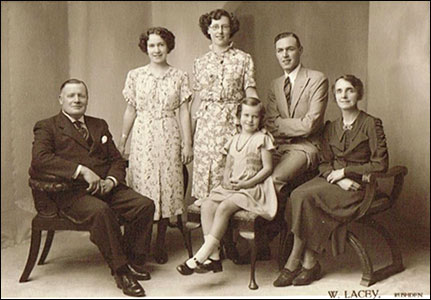 |
Horace (53) and Alice (48) with Nesta (19), Jean (15), Don (22)
and José (8) in December 1938
|
From 1940 onwards, the children were successively married: Don (1940), Nesta (1940), Jean (1952) and José (1953) (see family group sheet attached). In the case of the first two, during war-time, there were periods of separation, as Don (Air Force) and Nesta’s husband, my father Charles (Royal Engineers) had enlisted for war service. My brother Richard (b.1942) and myself (b.1944) spent most of our early years with Horace and Alice at Newton Road and we have a wealth of happy memories of our grand-parents there throughout our childhoods. Theirs was a tight-knit family, with Uncle Bert or Aunt Flo, Aunt Bess or other family members dropping by on a regular basis.
Horace and Alice were fortunate to celebrate both their Golden Wedding anniversary (1963) and their 60th anniversary (1973) together. He was a prolific writer of letters and small postcards, to be carefully deciphered, as his writing deteriorated with the passage of time. In those days, when the pace of life was slower, he would exchange letters with a friend in Canada, playing postal draughts. There was always a draught board on a small table in the front room, with the game in hand to be analysed; and such a game would last six or nine months each to finish.
A few photos from our albums may give a flavour of this remarkable man and wife:
|
Alice died in Kettering Hospital on January 12th 1974, aged 84 years, as a result of shock and severe burns after a tragedy in the home three weeks earlier. She had been making Horace his customary cup of morning tea, in her nightgown, when she inadvertently reached over the gas light on the stove, for the kettle, and the sleeve of her nightie caught fire. Horace heard her cries and took her outside and rolled her on the wet grass, putting out the flames, but Alice had already suffered third degree burns to her upper body and was not strong enough to recover.
|
60 Newton Road
Rushden
Northants
9:4:78
My Dear Elaine,
I am nearly 93 (6 more weeks) so do not accept [expect] the earth from me. I was very pleased to get that nice letter you sent me, I did enjoy the LOVE you sent me. I had a woman for nearly 70 years so had deal of love during that time.
|
|
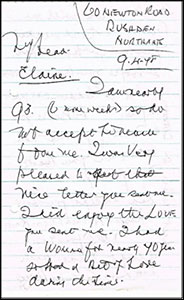
|
Thereafter, Horace lived alone at Newton Road for another five years, with much support from his eldest daughter, Nesta, who spent one day each week with him, keeping his larder stocked, and washing, ironing and cleaning for him. Writing to a family relative in the year before his death, Horace reflected on his love for Alice. Eventually, Horace was unable to care for himself and he moved to the Raunds Nursing Home in Newton Road, Rushden for the last few months of his life.
He died there on 8th May 1979, aged 93 years and was buried in Rushden cemetery, next to Alice (Plot L291) with the following M.I.
In loving memory of a dear wife & mother Eliza Alice WRIGHT died 12th Jan 1974 aged 84 years. In heavenly love abiding. Also her dear husband Samuel Horace died 8th May 1979 in his 94th year. Re-united.
|
Family Group Sheet
|
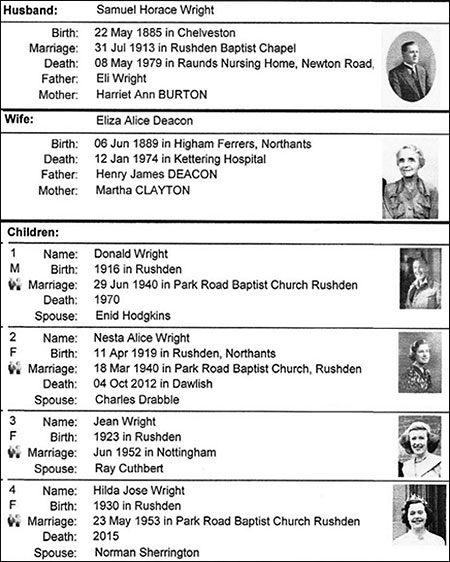 |
|
|
Stuart Drabble
Dec. 2003, latest update March 2018
|
|